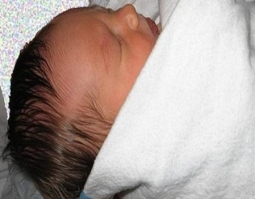People are left outside unable to vote.
Knight Fellow Hena Cuevas teaching stand-up techniques

"Lady" was born at the polling station
When I first learned that every eligible voter in Peru had to vote, I thought it sounded like a pretty good idea. That is until election morning when I heard on the radio that a 21-year old woman in the Andes had just given birth AT the polling station! Despite the labor contractions she was feeling, she showed up to cast her ballot just in the nick of time, right before the baby girl arrived. Her reason? She wanted to avoid getting fined.
The law states that anyone under the age of 70 must vote, or they face a fine which can go up to $35! Not paying up means that among other things, you can’t cash checks, or deal in legal transactions. Needless to say, voter turnout is pretty high. But, on Election Day it was obvious the system simply couldn’t handle the large numbers of people who came out.
Since Enlace Nacional (the national newscast of my local partner Red TV) airs 24 hours late because it relies mostly on reports produced by the affiliates (and regional shows air at 10pm), I suggested we work on stories which could hold, and would make the mayoral race in Lima relevant to the viewers in the rest of the country. One of those dealt precisely with the chaos at one polling center.
We arrived just as the doors were closing while a couple dozen people were left outside, clamoring to be let in. The reasons were many: some lived very far away and traffic was unbearable; others were sent to the wrong polling station, and one woman with a small child said cab drivers were charging upwards of $20 to transport people. News reports on the evening news showed this scenario was unfortunately repeated throughout the rest of Peru.
What I found interesting is the people at our polling station all wanted at least a note, or some sort of excuse so as to not pay the fine. One woman had her national ID stolen while in line! Sadly she was getting a double whammy: her wallet gone, and on top of that having to pay despite showing up. Not even the police- who handled the theft- were able to get her out of that.
Enlace Nacional can’t compete with the big Lima stations with their wall-to-wall coverage, but instead of being a negative, I am convincing the reporters that it’s actually an advantage. What we can do is tell those hidden stories to make what’s going on in the capital relatable to the rest of the country.
So, we did a piece on what downtown street vendors who work around City Hall expect from their new neighbor. The story demonstrated that certain issues which are relevant to the population sometimes don’t even register with politicians. Case in point was the vendor in the wheelchair who wanted improvements in the handicap law, and the juice woman who was worried about health coverage. Almost three days later Lima still doesn’t have a mayor as the race is so tight the two main candidates are less than a percentage point apart. And everything indicates it will come down to just a few votes. Perhaps they should have allowed the newborn baby to vote after all. Oh, and I’m happy to report mother and daughter are doing well. The name of this future voter? Lady.